
The First and Only Weekly Online Fanzine Devoted to the Life and Works of Edgar Rice Burroughs |
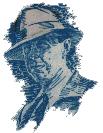 |

The First and Only Weekly Online Fanzine Devoted to the Life and Works of Edgar Rice Burroughs |
 |









|
Chattering From The Shoulder No. 29 Thoughts about The Son of Tarzan By David Arthur Adams |
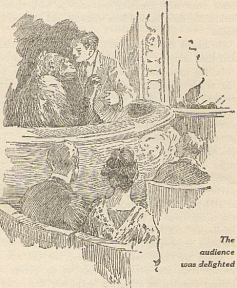 |
  |
 |
Even as a kid, I thought that Jack's killing of the black man in
chapter 6 was wanton murder. He and Akut come upon a native village
and scare a group of children playing beside a river. The children run
back to the village and a group of warriors come out and throw spears at
them, but no one is harmed.
Burroughs tells us that "rage and hate consumed him." Jack and Korak escape well out of danger, but when the natives turn back toward home "hot blood of revenge coursed through his veins until he saw his pursuers through a scarlet haze." |
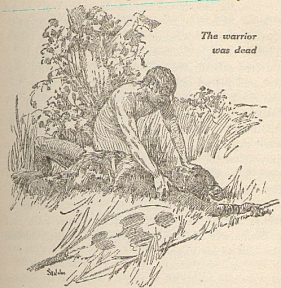 |
Jack follows the natives and strangles a man to death, "stalking
him as Sheeta, the panther, stalked his prey." After the killing,
Jack feels a strange desire. He wants to give the cry of the bull-ape,
but his voice is silent. Burroughs tells us that this silence was
to typify all his future kills. Later, Akut, renames Jack, Korak, which
means "The Killer."
It seems to me an entirely suitable cognomen. I even went so far as to call Korak a serial killer in one of my articles, which raised some protest from fans. Maybe so, but a twelve-year-old boy who can kill a man without compunction and wear his clothes without a qualm is certainly not your normal American lad. At least he was good at his trade. |
 |
Burroughs' wrote a strange boy's book in The Son of Tarzan. It is filled with cruelty, abuse, racism, and murder, yet it is one of the favorites of many fans. I still enjoy reading it today despite the flaws because it is such a raw tale. It's a savage buddy novel that pits a loner against the world with absolutely no holds barred. J. Allen St. John's charming drawings do much to dispel the underlying horror of this tale. The lovely Edenic scenes in the jungle with Meriem, Jack's true love, are blissful, yet even this turns into another Burroughsian episode of near-rape by an hideous Arab-Negro half-caste. Korak's story recapitulates Tarzan's own in many ways, but one can't help feeling that this son of a survivor is even darker and more brooding than his father. |
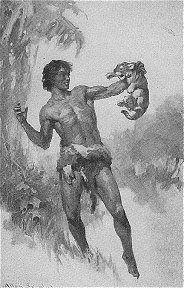 |
One recalls the silent, grim determination of Korak slogging through
the jungles and swamps to bring death to Obergatz, Lu-don, and Mo-sar in
Pal-ul-don. Thus he was the savior in the penultimate chapter of
Tarzan
the Terrible, "The Messenger of Death" as Burroughs entitles chapter
24. I don't think Jack speaks a single word in the entire novel.
Jane is glad to see him and weeps on his shoulder and Tarzan puts his arms
around them both. Presumably Jack had served on the front during
World War I, and those experiences may have made him even more withdrawn
than he already was.
In Tarzan and the Golden Lion, Jack seems to have recovered a great deal and even laughs at Tarzan's efforts to bring up a lion cub. Jack and Meriem have a son, Jack Clayton, Jr. whom they seem to be raising in a normal fashion at Tarzan and Jane's bungalow according to the second chapter of Tarzan and the Ant Men. |
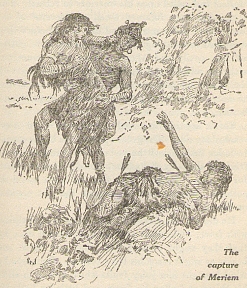 |
There is no doubt that Jack led as strange a life as his father. In many ways even stranger because he had the additional burden of being the son of the most famous feral man in history. He seemed doomed to recapitulate his father's childhood in the jungle, but as in Tarzan's case, it was a woman who gave him the saving link to civilization and normality. We do not know what happened to Jack and Meriem because nothing more was written about them after the odd closing scene in Ant Men. Just as they thought that the great Tarzan was a mental wreck in a wheelchair it is discovered that this was really the impostor, Esteban Miranda. At the last moment Tarzan calmly walks into the room and shocks everyone, the way he enjoyed doing to the apes since his youth. I think that Jack and Meriem must have moved to England to live calmly in the countryside away from the madness and death that seemed to surround Tarzan and Jane. They probably read ERB's later books and shook their heads and went out to stroll in the gardens. |


Donald Barthelme wrote the following in his The Dead Father.
I take the liberty of inserting different names."You two children have walked me many kilometers," said Tarzan.
"So we have," said Meriem.
"With scant regard for your own comfort. Your own projects. Of which you doubtless have a great many. You have labored on and on and on and on. For me."
"That is the case, said Meriem."
"What of yourselves? Your two lives?"
"In what sense, what?"
"What purpose? What entelechy? What will you do with yourselves when it is all over?"
Meriem looked at Korak.
"What will we do with ourselves when it is all over?"
Korak shook his head.
"I'd rather not answer that question if you don't mind," she said.
"Why not?"
"I haven't an answer.""
Like Jack said in the last chapter of The Son of Tarzan,
"There is but one Tarzan. There can never be another."THE END
For more information on the art and text of this novel,
visit the
ERB C.H.A.S.E.R. ENCYCLOPEDIA
angelfire.com/trek/chaser
The J. Allen St. John Illustrations from The Son of Tarzan
are featured at:
ERBzine 0487 ERBzine 0488 ERBzine 0489
|
Nkima Chat Series II Intro |
Chat 26: Tarzan of the Apes African Adv. Story |
Chat 27: Return of Tarzan Some Thoughts. . . |
|
Chat 28: Beasts of Tarzan St. John Illustrations |
Chat 29: Son of Tarzan Thoughts About. . . |
Chat 30: Tarzan and the Jewels of Opar Two Psychological Investigations |
|
Chat 31: Jungle Tales of Tarzan I A Novelistic Reading I |
Chat 32: Jungle Tales of Tarzan II Novelistic Reading: 12 Lunar Labors |
Chat 33: Tarzan the Untamed: Imaginative Deaths of Enemies |
|
Chat 34: Tarzan the Untamed: ERB's Book of the Lion |
Chat 35: OFs of OB |
Chat 36: Tarzan and the War Against the Hun |
|
Chat 37: The Convolutions of Tarzan and the Golden Lion |
Chat 38: Tarzan and the Ant Men An Infantile Romance |
Chat 39: Tarzan and the Ant Men Lacanian Analysis |
|
Chat 40: Tarzan and the Tarzan Twins A Story for Children of All Ages |
Nkima'sChattering From The Shoulder Main Introduction and Contents Page |
Chat 41: Tarzan the Magnificent Tarzan and the Magic Women Pt. 1 |
![]()
![]()
![]()
Issue
0668

BILL
HILLMAN
Visit
our thousands of other sites at:
BILL
AND SUE-ON HILLMAN ECLECTIC STUDIO
ERB
Text, ERB Images and Tarzan® are ©Edgar Rice Burroughs, Inc.-
All Rights Reserved.
All
Original Work ©1996-2002/2010 by Bill Hillman and/or Contributing
Authors/Owners
No
part of this web site may be reproduced without permission from the respective
owners.